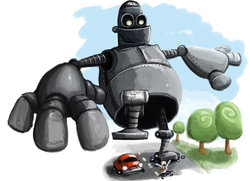The tech and automation job-quake is finally gaining attention, with predictions that nearly half of American jobs will be lost within a couple of decades. Yet too many leaders still avert their eyes, making decisions through a rear-view mirror rather than planning for a horizon already upon us. Even worse, the only "solution" floated so far is that government hand everyone an annual stipend for doing nothing at all.
Already, technology performs countless functions earlier done exclusively by people. When tablets on restaurant tables take people's orders, software guides our shopping online (while automation increasingly controls warehouses), and driverless cars presage huge job losses in the transportation sector, we see the convulsed employment markets of tomorrow.
Even now, jobs are polarized, with large numbers of people relegated to low-wage jobs that are often part-time and without benefits. And the U.S. industrial job base is predicted to shrink as radically as the agricultural job base shrank earlier. But unlike industrialization, automation does not offer large numbers of replacement jobs.
So, what are we to do with the "surplus" populations that technological advances such as apps, "sharing economy" business models, artificial intelligence systems, and automation leave in their wake? Long ago, the liberal economist Robert Theobald proposed a guaranteed annual income, and even conservative economic godfather Milton Friedman proposed a negative income tax providing people with no-or-low earnings a government stipend.
That these measures are being proposed again makes no sense. Neither gives recipients the opportunity to do meaningful work, robbing us of necessary contributions to our socio-economic life. Nor do they reward positive behaviors and discourage harmful ones, address irresponsible economic policies and business practices, take into account the damage to our health and natural habitat of such policies and practices, or address the power imbalances that lie behind chronic economic inequity and inefficiency.
In starkest terms: the Baltimore riots may have relaunched conventional discussions about economic opportunity for communities in crisis, but we've heard nothing new as entire segments of employment careen towards crisis.
Yet an effective response is available to the challenges of the postindustrial world: economic policies that support and reward activities that machines and high-technology devices, no matter how sophisticated, cannot perform: being creative, flexible, and caring.
A caring economy is the best app for solving the looming jobs crisis.
When government stipends are given, they should foster the work of caring and caregiving, be it for humans or for nature's life-support systems, in the household and community economy - investments that new metrics show have a huge payoff. We should fund training for the high-quality caring that both psychology and neuroscience show is foundational to optimal human development - especially for developing our unique human capacities for consciousness, problem-solving, creativity, and caregiving.
This means changing the rules of the game so the essential work of caring for our children, our growing elderly population, and ourselves has high value, with funds allocated for training and support, including caregiver tax and social security credits. Under these new rules, expenditures supporting parental leave, childcare, education, and health care will no longer be expensed every year, adding to government deficits, as is now the case. These expenditures will be recognized as essential investments in a nation's most important asset: its future human capital. They will be amortized over the span of a generation, as is done for investments in the other infrastructures that make it possible for organizations to function effectively.
This approach will help ensure that we have the flexible, innovative, and caring people needed for the postindustrial era. Support for care work will cut through cycles of poverty, especially the disproportionate poverty of women worldwide due the fact they do the work of care for low or no pay. Policies that promote caring will lead to generally more caring and effective business and government practices and policies worldwide. And because people will learn to really value caring, this approach will lead to a more responsible and caring ethos for science, and hence also for the development of technology. The Caring Economy Campaign, including its new Social Wealth Economic Indicators which show the enormous economic value of the work of care, is working to achieve these goals.
What proof is there that such a holistic economic approach equips people for a future of software, apps, and automation? Look to the creators of this future themselves: the engineers of the emerging economy are poster children for how high-quality human capital provides economic vibrancy. Most have been nurtured and equipped for creativity.
The only question now is, will we equip more of our people for tomorrow?
Riane Eisler is founder of the Center for Partnership Studies' Caring Economy Campaign and author of The Real Wealth of Nations: Creating a Caring Economy.

